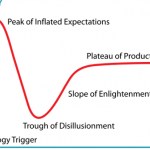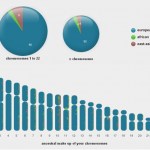23andMe
Update 30/11/10: 23andMe has extended their 80% discount until Christmas, without a need for a discount code.
Personal genomics company 23andMe has made some fairly major announcements this week: a brand new chip, a new product strategy (including a monthly subscription fee), and yet another discount push. What do these changes mean for existing and new customers?
The new chip
23andMe's new v3 chip is a substantial improvement over the v2 chip that most current customers were run on (the v2 was introduced back in September 2008). Firstly, the v3 chip includes nearly double the…
Update 30/11/10: 23andMe has extended their 80% discount until Christmas, without a need for a discount code.
Personal genomics company 23andMe has made some fairly major announcements this week: a brand new chip, a new product strategy (including a monthly subscription fee), and yet another discount push. What do these changes mean for existing and new customers?
The new chip
23andMe's new v3 chip is a substantial improvement over the v2 chip that most current customers were run on (the v2 was introduced back in September 2008). Firstly, the v3 chip includes nearly double the…
Back in June I launched a new blog, Genomes Unzipped, together with a group of colleagues and friends with expertise in various areas of genetics. At the time I made a rather cryptic comment about "planning much bigger things for the site over the next few months".
Today I announced what I meant by that: from today, all of the 12 members of Genomes Unzipped - including my wife and I - will be releasing their own results from a variety of genetic tests, online, for anyone to access. Initially those results consist of data from one company (23andMe) for all 12 members; deCODEme for one…
Two days ago I reported a rumour that the FDA might have convinced genotyping chip provider Illumina to stop providing its products to direct-to-consumer genetic testing companies - a move that would effectively prevent these companies from being able to operate.
The rumour seemed plausible at the time, based on two pieces of evidence. Firstly, a letter sent to Illumina by the FDA in June warned the company that the use of its chips by personal genomics companies appeared to violate FDA regulations:
Although Illumina, Inc. has received FDA clearance or approval for several of its devices,…
Following up on the rumours I posted about yesterday regarding a potential bid by the FDA to choke of direct-to-consumer genetic testing companies' supply of genotyping chips, I received the following statement by email from 23andMe's PR firm:
23andMe is engaged in an ongoing process with the FDA.
23andMe understands that Illumina is also engaged in such a process.
23andMe has no reason to believe there will be an interruption in the supply of Illumina chips at this time.
I understand we'll have some more clarity on this issue from the FDA tomorrow.
I mentioned last week on Genetic Future that a reporter with the Washington Post, Rob Stein, had emailed the National Society of Genetic Counsellors to search specifically for people with negative experiences of personal genomics for an upcoming article on the industry. At the time I called for personal genomics customers with positive experiences to email Stein, to ensure that he had a balanced view of the industry's impact.
Stein's article came out a couple of days ago, presumably timed for maximum impact in advance of the FDA's meeting on lab-developed tests over the last two days.…
As an addendum to my previous post on the controversial "longevity genes" study, you should go and check this out. It's a post on the blog of personal genomics company 23andMe, and it's a pretty impressive piece of scientific dissection of the longevity GWAS paper - in addition to detailing a variety of methodological problems with the study, the authors actually used the 23andMe database to look at the predictive value of the longevity GWAS algorithm on their own customers:
We took a preliminary look in our customer data to see if the proposed SNP-based model described in…
In October last year I reported on a presentation by direct-to-consumer genetic testing company 23andMe at the American Society of Human Genetics meeting in Honolulu, in which the company described results of genetic association studies performed using combined genetic and survey data from their customers. The results of their study include replication of several known associations for traits like hair colour, eye colour and freckling, as well as the discovery of previously unpublished associations for things like asparagus anosmia (the ability to smell urinary breakdown products after eating…
Â
The photo above isone of several posted by NeuroDojo, who has a lovely post on them.
Genetic Future ponders the 23andMe Oops-wrong-data event. Turns out it was a flipped tray.
"I'm frankly astonished that this was possible at an accredited genotyping facility - plate-flipping is an age-old problem, but trivial to prevent with good plate/machine design that only allows plates to be loaded in a single orientation."
Same source carried a good strong early account of this mix-up as well.
Genomeboy ponders a dog's life, as glimpsed through its genome.
Steven Berlin Johnson…
I posted yesterday on a serious incident at 23andMe's sample processing lab, LabCorp, that resulted in the wrong data being sent to up to 96 customers. The company has just posted a blog entry explaining the cause of the problem and the approaches being taken to ensure it doesn't happen again.
As several commenters had speculated, the cause of the problem appears to have been the flipping of a 96-well plate (a solid block of plastic containing 96 separate samples in individual wells) by 180 degrees, resulting in all of the samples being in the incorrect locations for downstream analysis.…
Personal genomics company 23andMe has revealed that a lab mix-up resulted in as many as 96 customers receiving the wrong data. If you have a 23andMe account you can see the formal announcement of the problem here, and I've pasted the full text at the end of this post.
It appears that a single 96-well plate of customer DNA was affected by the mix-up. This resulted in incorrect results being sent to customers, with alarming consequences in some cases; one mother posted on the 23andMe community about her distress upon discovering that her son's results were incompatible with the rest of the…
The brief Golden Age of direct-to-consumer genetic testing - in which people could freely gain access to their own genetic information without a doctor's permission - may be about to draw to a close. In a dramatic week, announcements of investigations into direct-to-consumer genetic testing companies by both the FDA and the US Congress have sent the personal genomics industry into a spin, and it is still impossible to say exactly which way it will be pointing once the confusion passes.
I've been frustratingly unable to find the time to cover the developments as they happened due to other…
A colleague just pointed me to an entry on Brad Templeton's blog where Templeton reveals some bizarre connections between people he has met as distant cousins via 23andMe's Relative Finder algorithm. Nothing too spooky, but a precursor of things to come if (as I hope and expect) 23andMe manages to ride out the current troubles besetting personal genomics and continue building its genetic database.
(H/T John).
Subscribe to Genetic Future.
Follow Daniel on Twitter
Over at Gene Expression, Razib suggests that trouble lies ahead for personal genomics company 23andMe. Although I'm generally a bit of a cheerleader for the Mountain View-based startup, I must admit the signs over the past year or so haven't been good: two rounds of lay-offs, the departure of co-founder Linda Avey, and the apparent deployment of $4M from a recent funding round to pay back a loan from fellow co-founder Anne Wojcicki.
Razib also notes some anonymous employee reviews of the company on GlassDoor suggesting poor morale among 23andMe workers; it's hard to make too…
I'm hearing about rumblings at 23andMe, and not in a good way. The company made a big splash a few years ago, and came highly recommended by friends (e.g., "They know their science, and have a bottomless pool of money"). This story at BNET got my attention though, and confirmed what many have been hinting at, or just telling me straight-up. Let's start the from the beginning. Back in late 2008 23andMe seemed absolutely untouchable. Here's Andrew Yates of Think Gene from then:
People, 23andMe isn't going anywhere. They are the Bill & Melinda Gates Sergey & Anne Brin Foundation,…
Blaine Bettinger has an absolutely wonderful post where he compares his results for type 2 diabetes from 23andMe and DeCODEme.
I really liked his post and I appreciated the way he showed the data from the two companies and elaborated on their interpretation of his genotype and his risk.
Interestingly, his story goes beyond a simple relationship, where one base changes, one amino acid changes, and voila! you've got the disease.
Bettinger describes what happens when there are changes in multiple genes and how those changes can have a cumulative effect on evaluating the risk of developing a…
I'm currently playing around with my 23andMe data in the deCODEme browser.
deCODEme's (apparently new?) Relationship Check feature, which appears to be a targeted version of 23andMe's Relative Finder algorithm, allows users to compare their genetic data to other profiles in the database and calculate the probability of a familial relationship.
My comparison with notoriously cranky deCODE CEO Kari Stefansson (pictured, left) gave me this reassuring result:
Phew!
On Twitter, genetic genealogist extraordinaire Blaine Bettinger noted that deCODEme appears to have also…
Late last week I noted an intriguing offer by personal genomics company deCODEme: customers of rival genome scan provider 23andMe can now upload and analyse their 23andMe data through the deCODEme pipeline.
On the face of it that's a fairly surprising offer. As I noted in my previous post, interpretation is what generates the real value for personal genomics companies, so giving it away for free seems a bizarre approach to business - especially for a company living on the edge of a financial precipice. However, I also argued that the intention here is likely to be to generate an…
A curious tweet this morning from personal genomics company deCODEme, barely a few weeks after the declaration of formal bankruptcy of parent company deCODE Genetics:
@decodegenetics: Migrate to deCODE this winter! Upload your genetic data for free. http://www.decodeme.com/data-upload
Here's a description of the service from the URL in the tweet:
deCODEme wants to give even more people the chance to enjoy the best in personal genomics. Our bioinformatics team has just launched a simple system to enable existing customers of 23andMe⢠to migrate their data into deCODEme and to join our…
Added in edit: for superb analysis of the announcement from multiple angles, you should also check out Dan Vorhaus' three incisive articles on Genomics Law Report.
Personal genomics company 23andMe announced yesterday on its blog (and in an email to customers) of impending changes to its product line. Until now 23andMe has offered only two products: its $399 full scan, and a $99 Research Revolution product that offers limited functionality and a focus on common disease risk prediction.
There are two major components of the altered product line. Firstly, customers will now be…



